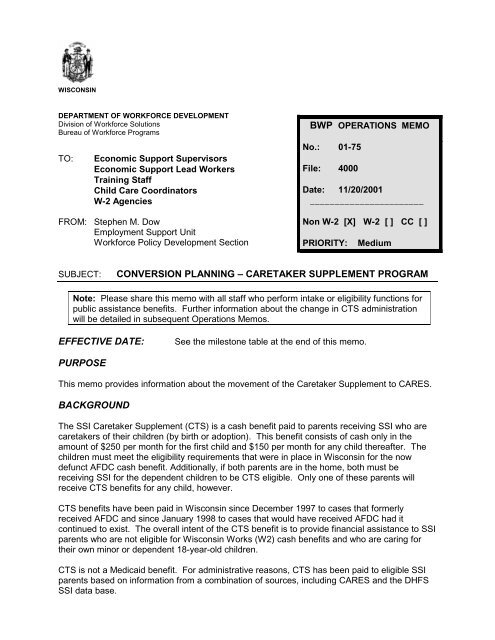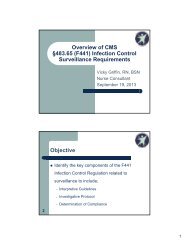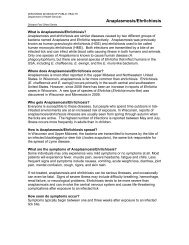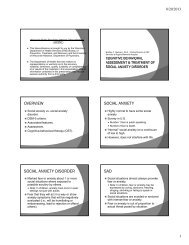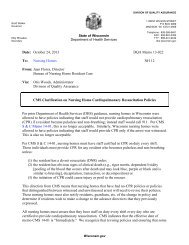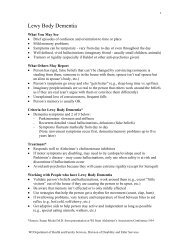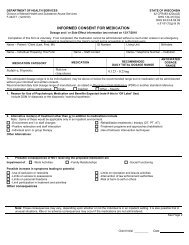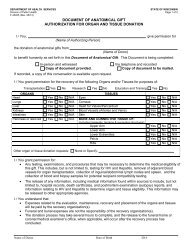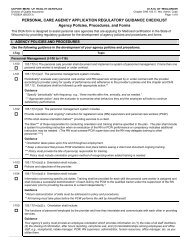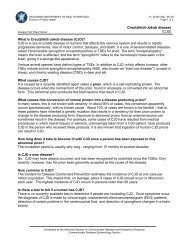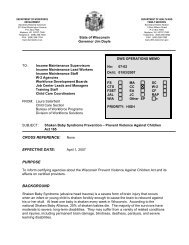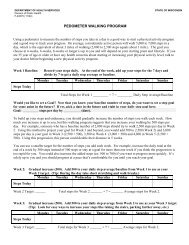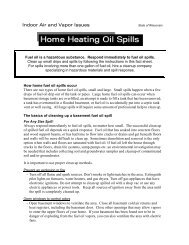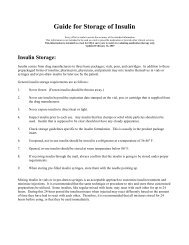01-075.pdf
01-075.pdf
01-075.pdf
You also want an ePaper? Increase the reach of your titles
YUMPU automatically turns print PDFs into web optimized ePapers that Google loves.
WISCONSIN<br />
DEPARTMENT OF WORKFORCE DEVELOPMENT<br />
Division of Workforce Solutions<br />
Bureau of Workforce Programs<br />
TO: Economic Support Supervisors<br />
Economic Support Lead Workers<br />
Training Staff<br />
Child Care Coordinators<br />
W-2 Agencies<br />
FROM: Stephen M. Dow<br />
Employment Support Unit<br />
Workforce Policy Development Section<br />
SUBJECT: CONVERSION PLANNING – CARETAKER SUPPLEMENT PROGRAM<br />
Note: Please share this memo with all staff who perform intake or eligibility functions for<br />
public assistance benefits. Further information about the change in CTS administration<br />
will be detailed in subsequent Operations Memos.<br />
EFFECTIVE DATE: See the milestone table at the end of this memo.<br />
PURPOSE<br />
This memo provides information about the movement of the Caretaker Supplement to CARES.<br />
BACKGROUND<br />
BWP OPERATIONS MEMO<br />
No.: <strong>01</strong>-75<br />
File: 4000<br />
Date: 11/20/20<strong>01</strong><br />
_______________________<br />
Non W-2 [X] W-2 [ ] CC [ ]<br />
PRIORITY: Medium<br />
The SSI Caretaker Supplement (CTS) is a cash benefit paid to parents receiving SSI who are<br />
caretakers of their children (by birth or adoption). This benefit consists of cash only in the<br />
amount of $250 per month for the first child and $150 per month for any child thereafter. The<br />
children must meet the eligibility requirements that were in place in Wisconsin for the now<br />
defunct AFDC cash benefit. Additionally, if both parents are in the home, both must be<br />
receiving SSI for the dependent children to be CTS eligible. Only one of these parents will<br />
receive CTS benefits for any child, however.<br />
CTS benefits have been paid in Wisconsin since December 1997 to cases that formerly<br />
received AFDC and since January 1998 to cases that would have received AFDC had it<br />
continued to exist. The overall intent of the CTS benefit is to provide financial assistance to SSI<br />
parents who are not eligible for Wisconsin Works (W2) cash benefits and who are caring for<br />
their own minor or dependent 18-year-old children.<br />
CTS is not a Medicaid benefit. For administrative reasons, CTS has been paid to eligible SSI<br />
parents based on information from a combination of sources, including CARES and the DHFS<br />
SSI data base.
OM <strong>01</strong>-75 Page 2 of 7<br />
To (1) insure that payments occur in a timely manner and are made only to eligible SSI parents,<br />
(2) insure proper notice of eligibility and payment award and (3) simplify federal reporting of use<br />
of Temporary Assistance to Needy Families (TANF) funds, CTS will become a program of<br />
assistance in CARES in January 2002.<br />
CTS IN CARES<br />
The conversion of CTS payments from a database system with some eligibility requirements<br />
checked by EDS to a program of assistance in CARES will accomplish several major tasks:<br />
1. All CTS cases will be maintained within CARES for all eligibility components (financial and<br />
non-financial). EDS will simply act as the check printer and EFT intermediary on CTS<br />
payments. EDS will continue to tack the CTS payment amount (as determined and<br />
transmitted to EDS by CARES) on to SSI payments to SSI recipients.<br />
2. CARES will systematically transmit CTS payment information to EDS twice per month.<br />
3. CARES and CARES ES workers will generate client notices regarding CTS, including<br />
award, reduction, termination and recoupment and manual payment.<br />
4. CARES will set review dates and alert ES workers to due dates for CTS client reviews.<br />
5. CARES will maintain CTS eligibility, grant amount and eligible children on screen ECRD.<br />
ES workers will not need to enter CTS income on AFUI after ACT date in February 2002.<br />
6. CARES will contain all information required by DWD for CTS TANF reporting to the federal<br />
government.<br />
7. This automation will set the correct categorical eligibility for Food Stamp cases and update<br />
CARES screen ANBR with SSI eligibility information.<br />
During Phase I of CTS implementation in CARES, CARES will not be capable of systematically<br />
generating manual payments (auxiliary benefits in unusual cases) or effecting recoupment of<br />
overpayments. ES workers will authorize these adjustments via fax to EDS and EDS will make<br />
the payment or establish the recoupment against future CTS/SSI benefits.<br />
CASE CATEGORIES<br />
CTS will be available to ES workers in the CARES production environment beginning Monday,<br />
January 28, 2002. Immediately prior to that date, screen ACPA will be defaulted to “Y” (Yes)<br />
for “requesting CTS” beginning the month of March, 2002 (0302), for all cases in CARES that<br />
are known as having been recipients of CTS in February 2002. This group of cases can be<br />
described as comprised of Category 1 and 2 cases (see following).<br />
CATEGORY 1 CASES<br />
Category 1 cases are those that were receiving AFDC in November 1997 and, regardless of the<br />
category of Medicaid eligibility of the children in the case, were administratively transferred to<br />
the CTS database maintained by Deloitte Consulting. This group has been historically referred<br />
to as “grand-fathered” for CTS, although this is somewhat of a misnomer, since eligibility<br />
requirements for AFDC cash must still be met by these cases. Some cases may lose CTS<br />
eligibility when converted to CARES production due to excess income or assets for the AG size.
OM <strong>01</strong>-75 Page 3 of 7<br />
CATEGORY 2 CASES<br />
Cases in this category are those that would have been eligible for AFDC had it continued to<br />
exist after November 1997. This group has been historically referred to as “new” cases for<br />
CTS. Since the children in these cases are currently meeting AFDC eligibility requirements and<br />
receiving AFDC Medicaid (MA-R), it is unlikely that conversion alone will result in termination of<br />
CTS eligibility for any of these children.<br />
CATEGORY 3 CASES<br />
Category 3 cases were receiving AFDC in November 1997, and were administratively<br />
transferred to the CTS database maintained as part of the CARES project, but have since had<br />
their cases closed in CARES. On a monthly basis, approximately 600 children are in these<br />
cases. This group has been historically referred to as “grand-fathered cases closed in<br />
CARES”.<br />
CONVERSION TO CARES<br />
To support the conversion of CTS to a program of assistance in CARES, local ES workers will<br />
be supplied, by December 15, 20<strong>01</strong>, with the following:<br />
1. Case lists by county, agency and ES worker identifying CTS cases open in CARES for<br />
some other program of assistance (Category 1 and 2 cases).<br />
2. Case lists by county of cases closed in CARES that are in Category 3.<br />
CONVERSION OF CATEGORY 1 & 2 CASES<br />
EDS will send a letter to all Category 1 and 2 cases prior to February 2002 informing them that<br />
beginning with benefits for March 2002, local agencies will be determining CTS eligibility and<br />
benefit amounts using CARES. A copy of this letter will be provided to local agencies in a later<br />
Operations Memo.<br />
Beginning January 28, 2002, ES workers will find ACPA defaulted to “Y” for all CTS cases<br />
already in CARES. As of September 20<strong>01</strong>, 6,047 cases open in CARES were receiving CTS<br />
income. These are all Category 1 or Category 2 CTS cases and will be subject to conversion.<br />
ES workers are instructed to do the following with each case, in the order listed:<br />
1. On converted cases, do not change the override filing date on ACPA for CTS. Doing so will<br />
duplicate CTS payments already made to a case prior to March 2002. For converted cases<br />
(Category 1and 2 cases, above) ES workers should not be determining CTS eligibility for<br />
months prior to March 2002 using CARES.<br />
2. Prior to ACT date in February 2002, end date any CTS income listed on AFUI as OT or<br />
OTFS. Notes: It is important that the ES worker end date, rather than delete, this income.<br />
The ES worker should also be certain that OT income that is end dated is the CTS cash<br />
benefit, not some other unearned income.<br />
3. Run and confirm eligibility for CTS for March 2002. This will establish the CTS payment<br />
amount in CARES that can be read by other programs of assistance for their eligibility<br />
determinations. Note: CTS verification requirements in CARES mirror the former AFDC<br />
verification requirements.
OM <strong>01</strong>-75 Page 4 of 7<br />
4. Confirm eligibility for other programs of assistance, such as FS and CC for March 2002 prior<br />
to ACT date in February 2002. Be sure to check that other programs of assistance have<br />
been determined correctly. Do not confirm incorrect benefits.<br />
CONVERSION OF CATEGORY 3 CASES<br />
The DHFS will pay CTS benefits to Category 3 cases through February 2002 based on<br />
determinations made without ES worker intervention.<br />
NOTE: For CTS benefits to be paid to Category 3 cases for March 2002 and subsequent<br />
months, these cases must be opened in CARES and their CTS eligibility<br />
confirmed, prior to ACT date in February 2002.<br />
By January 1, 2002 the DHFS will send Category 3 case heads information about this change,<br />
including an application form for CTS. A copy of this information letter will be provided to local<br />
agencies in a later Operations Memo. Also by December 15, 20<strong>01</strong> the DHFS will provide a<br />
report to each local ES agency detailing the case head name, child(ren’s) names, SSI mailing<br />
address and known phone numbers for each of these cases.<br />
Category 3 case heads will be informed that their completed CTS application must be sent back<br />
to their local agency no later than February 1, 2002. Caseheads will be provided with a return<br />
mail envelope addressed to their local agency. DHFS will monitor CARES activity regarding<br />
these case heads and terminate CTS benefits to CTS recipients (and send notice of termination<br />
of benefits beginning March 1, 2002) who were mailed an application and did not return it by<br />
ACT date in February. For all Category 3 cases in which the worker confirms CTS eligibility or<br />
denial prior to the ACT date in February 2002, CARES will generate a notice of eligibility or<br />
denial.<br />
PROCESSING APPLICATIONS FOR CTS FOR NEW (NOT CATEGORY 1, 2 OR 3)<br />
CASES<br />
Beginning January 28, 2002, ES workers will be able to run eligibility for new CTS applications<br />
back to January 1998.<br />
However, ES workers are strongly cautioned to verify whether CTS benefits have already been<br />
paid to a parent for any of the retroactive months for which eligibility is being run. These are<br />
cases that are not listed on the Category 1, 2 or 3 case lists sent to counties in December 20<strong>01</strong>.<br />
ES workers should not enter CTS income on AFUI for these cases. ES workers will find that<br />
ACPA is defaulted to “Y” for CTS for all new cases.<br />
NOTE: If a ES worker runs eligibility in CARES by passing dates for any program for any<br />
month prior to March 2002 and does not end date any CTS income on AFUI for<br />
the month they are determining eligibility, CTS income may be counted twice for<br />
that month (once for any month it is listed on AFUI and once for any month<br />
systematically determined by CARES). This is especially important for Food<br />
Stamp cases. The CARES budget screen EFTG has been enhanced to include<br />
a separate line for CTS income.
OM <strong>01</strong>-75 Page 5 of 7<br />
ONGOING CASELOAD MANAGEMENT<br />
Once confirmed in CARES, all CTS eligibility must be reviewed every six months. These<br />
reviews may be non-face-to-face. Streamlined CTS review forms will be available to local<br />
agencies prior to March 1, 2002.<br />
If an ES worker identifies that a CTS overpayment or incorrect payment has been made for any<br />
child(ren) for any month(s), the ES worker must complete a recoupment form (DWS-12828)<br />
and fax it to EDS at 608-221-0991. The ES worker should also make a comment on ACCC in<br />
CARES noting the details of this recoupment. The ES worker must also send a manual notice<br />
of overpayment or incorrect payment to the SSI parent. EDS will set up the overpayment or<br />
incorrect payment as a recoupment against future SSI or CTS payments to the parent. EDS<br />
will be referring any SSI parent with questions or a request for waiver of CTS recoupment to his<br />
or her local ES worker.<br />
If a ES worker needs to run CTS eligibility for specific dates using CARES (running with dates),<br />
eligibility will show on CARES eligibility screens. However, this information will not be<br />
systematically transmitted to EDS for payment. These instances must be made known to EDS<br />
manually. The ES worker must complete a CTS manual payment form (DWS-12825) and fax it<br />
to EDS at 608-221-0991. The ES worker must also populate CARES screen ACMP with<br />
information about each instance of manual payment and provide notice to the client about the<br />
benefits that will be received.<br />
There may also be instances in the future where CARES is unable to systematically transmit<br />
eligibility for past months in a particular case. The manual payment process described in the<br />
paragraph above may also be used for this purpose. However, manual payments may be<br />
generated only when CARES cannot or fails to transmit a payment to EDS, not simply to get a<br />
payment to the case head sooner than the general monthly payment cycle.<br />
Verification of financial and non-financial information is required for CTS as it is for other cash<br />
assistance programs. The ES worker should be using a “?” and “NV” to pend or fail the CTS AG<br />
for lack of verification. If the CTS case is also open in Medicaid, the ES worker may also need<br />
to use “Q?” and “QV” as with any type of Medicaid case.<br />
The following chart summarizes the circumstances under which the ES worker uses each<br />
verification code to pend or fail different programs of assistance.<br />
Verification<br />
Code<br />
SSN<br />
Citizenship Alien<br />
Status<br />
Pregnancy<br />
Disability<br />
Medicaid<br />
Assets<br />
For<br />
Elderly<br />
&<br />
Disabled<br />
Assets<br />
For<br />
Family<br />
MA<br />
All other<br />
Items<br />
CTS & Other<br />
Programs<br />
? Pend Pend Pass Pass Pend<br />
NV Fail Fail Pass Pass Fail<br />
Q? Pend Pend Pend Pend Pend<br />
QV Fail Fail Fail Fail Fail
OM <strong>01</strong>-75 Page 6 of 7<br />
CTS PAYMENT HISTORY PRIOR TO MARCH 2002<br />
Beginning January 28, 2002, all ES workers who have access to the WIOL subsystem in<br />
EDSNET will also have access to the WSSI subsystem in EDSNET. The viewable screens in<br />
this subsystem contain information about federal and state SSI, SSI-E and CTS eligibility and<br />
payment history. This information is being provided to ES workers so that they can correctly<br />
update CARES screen ANBR with SSI eligibility information. However, ES workers are strongly<br />
encouraged to rely on SOLQ for SSI eligibility and payment information whenever possible.<br />
Note: SOLQ does not contain information about SSI state supplement only cases in Wisconsin;<br />
this is where information on WSSI will be essential to the ES worker. SSI state<br />
supplementation only recipients who are parents may also qualify for CTS.<br />
ES workers must maintain the privacy of all information viewed on WSSI and record information<br />
found on WSSI only for case specific reasons<br />
ROLE OF EDS DURING AND AFTER CONVERSION OF CTS<br />
Beginning with benefits for March 2002, the role of EDS will be to simply add the CTS payment<br />
amount determined and transmitted from CARES for each CTS parent’s state SSI check. EDS<br />
will not be making any decisions about CTS eligibility, payment amount, recoupment or manual<br />
payment beginning March 1, 2002. Any SSI recipient who contacts the State SSI Unit at EDS<br />
regarding a CTS eligibility, payment or recoupment question or concern will be directed to<br />
contact his or her ES worker or the local agency (in the case of a caller who self-identifies as<br />
not currently receiving CTS).<br />
EDS runs a payment cycle for SSI benefits 4 times per month. In most cases, a recipient of SSI<br />
receives a single SSI check or receives an EFT to his or her bank account on the first of the<br />
month. Only when SSI benefits are recalculated are payments (check or EFT) made at other<br />
times of the month.<br />
CARES will transmit CTS benefit information to EDS twice per month. The SSI payment cycle<br />
that coincides with the CARES ACT date will contain the majority of CTS benefits for the<br />
following month. Approximately one week later (immediately prior to the benefit issuance “pulldown”<br />
date) CARES will transmit any additional cases that are payable for the following month.<br />
CHANGES TO AUTOMATIC UPDATING OF ANBR AND ANBC<br />
To assist all ES workers by providing accurate and current information about SSI eligibility,<br />
CARES screens ANBR and ANBC will be automatically updated, weekly, with the most current<br />
information available from the federal Social Security Administration and DHFS. ES workers<br />
are reminded that only parents who are receiving cash SSI payments as either a federal/state<br />
SSI recipient or a state-only recipient may qualify for CTS for their eligible children. Parents<br />
who receive Medicaid under provisions of sec. 1619(b) of the Social Security Act are not<br />
qualified for CTS benefits because they are not receiving cash SSI benefits.<br />
TRAINING<br />
The DWD Training Unit will be coordinating CTS training events at regional and local agency<br />
sites during January and February 2002. Information about specific training dates will be<br />
provided to local agencies in late November or early December 20<strong>01</strong>.
OM <strong>01</strong>-75 Page 7 of 7<br />
CONVERSION MILESTONES<br />
DATE MILESTONE<br />
December 15, 20<strong>01</strong><br />
January 1, 2002<br />
January 25, 2002<br />
January 25, 2002<br />
January 28, 2002<br />
January 28, 20<strong>01</strong><br />
through ACT date in<br />
February 2002<br />
January 28, 2002<br />
January 28, 2002<br />
through ACT date in<br />
February 2002<br />
CONTACT<br />
ACT Date in<br />
February 2002<br />
February 1, 2002<br />
DHFS sends case lists of CTS recipients by local, agency and<br />
ES worker to local agencies for Category 1-2 and Category 3<br />
cases.<br />
DHFS/EDS sends letter to all CTS caretaker parents informing<br />
them of changes in their case (all categories of CTS cases)<br />
and need to complete an application form for CTS (for<br />
Category 3 cases only).<br />
Second Operations Memo detailing CTS screens in CARES<br />
and MMIS Overview describing access and screens in the<br />
WSSI subsystem of EDSNET sent to local agencies.<br />
All Category 1 and 2 cases in CARES defaulted to “Y” for CTS<br />
on screen ACPA.<br />
CTS available in CARES as a Program of Assistance.<br />
Local agencies enter Category 3 cases in CARES as<br />
application forms arrive at local agencies.<br />
DES CARES Information and Problem Resolution Center<br />
WSSI (SSI State Supplement Payment System) available to<br />
all ES workers who have access to EDSNET.<br />
ES workers convert Category 1 and 2 cases by end dating<br />
CTS income on AFUI, running SFED or SFEX for March 2002,<br />
confirming CTS eligibility, then running and confirming<br />
eligibility for other programs of assistance for March 2002.<br />
Deadline for confirmation of converted Category 1, 2 and 3<br />
cases for March 1, 2002 payment of CTS.<br />
CTS mail-in application and review forms available to local<br />
agencies.<br />
Email: carpolcc@dwd.state.wi.us<br />
Phone: 608-261-6317 (Option #1)<br />
Fax: 608-266-8358<br />
Note: Email contacts are preferred. Thank you.<br />
DHFS/DHCF/BHCE/KL


